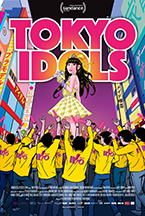TOKYO IDOLS

(The 2017 Sundance Film Festival kicked off on January 19 and ran through January 29. The HtN staff had boots on the ground and a crew working hard to review screeners hard like this, the awkward yet intriguing documentary Tokyo Idols .)
“Between the age limits of nine and fourteen there occur maidens who, to certain bewitched travelers, twice or many times older than they, reveal their true nature which is not human, but nymphic (that is, demoniac); and these chosen creatures I propose to designate as ‘nymphets.’ …I would have the reader see ‘nine’ and ‘fourteen’ as the boundaries – the mirrory beaches and rosy rocks – of an enchanted island haunted by those nymphets of mine and surrounded by a vast, misty sea.”
– Vladimir Nabokov, Lolita
Humbert’s island currently has a physical equivalent in the contemporary world. It’s called “Japan.”
Tokyo Idols, which premiered at Sundance 2017, conducts a tour through Japan’s increasingly popular culture of – not nymphets, but “idols,” cutely costumed young women who perform in cafes for audiences of devoted male followers. The documentary’s tour begins sunnily enough, but gradually guides the audience into the darker aspects of idol culture.
Kyoko Miyake’s film shows us through interviews and concert footage that idol culture isn’t a fad, it’s a religion. One of 19-year-old idol Rio’s songs stresses faith, worship, and pilgrimage…of herself, it’s plain to see. Two Rio fans profiled in the film are men in their forties who – well, they may be called “brothers,” but their veneration puts American groupies to shame. They spend a small fortune on memorabilia and events where they can shake hands with their favorite idols. Handshaking in Japan has a much more intimate implication than in the U.S.
Most of the performances in Tokyo Idols take place in Akhibara, a Tokyo district famous for its numerous idol cafes and focus on otaku culture. (It’s inaccurate to say that otaku is the Japanese equivalent of “geek,” but it’s a good start.) Akhibara storefronts, with numerous images of anime girls, appear in the film as transitions between interviews and performances.
I didn’t understand at first why interview subjects in Tokyo Idols continually referred to the performers as “girls,” when Rio is obviously an adult, despite her little-girl costumes. As the movie progresses, I realized Rio is practically a senior citizen in idol culture, one reason why she’s trying to shift to a career as a legit musician. Most idols don’t just dress underage, they are underage. We meet one idol who’s 14…and later one who’s ten years old, performing in a group of other prepubescent girls to audiences of eager men twice and often three times their age.
And that’s the biggest difference between Japanese idols and American Idol, or teen-girl performers in the States. Only one audience shown in the film has any females in it. In one scene, Rio meets a seven-year-old girl who’s a fan of her online videos, but they meet outdoors in daylight and not at a live show. There may be a difference in audiences watching idols online and fans attending performances, but the film is unfortunately vague on this point.
The focus of Tokyo Idols isn’t the online aspect of idol culture or the ways in which the music dovetails (or doesn’t) with J-pop – it’s about the lives of the idols and their most obsessive fans. On one hand, you can’t help but think of Lolita, especially as the idols onscreen are younger and younger. On the other hand, one mother points out that her daughter has become more independent and adult since joining an idol troupe. The little girls talk about developing talent and pursuing careers, and shrug off any idea that their fans might be at all improper or unsavory.
The fans are polite in interviews and well-behaved in concerts and in meetings with the girls. They talk at length about how wonderfully pure and innocent their favorite “girls” are. And then one fan of a pre-teen group says, “Their selling point is that they’re not fully developed. If they were older, they wouldn’t interest me,” and it’s difficult not to envision the dark underbelly of this culture. Whatever private sexual gratification these men might enjoy in their rooms plastered with idol photos, they reveal nothing of it in public and on camera.
Tokyo Idols admirably shows us the complex aspects of idol culture as it fits into contemporary Japanese culture – this is a billion-dollar industry in a country working its way through an economic recession. It may be a little basic for viewers who are familiar with otaku culture, and may not be musically focused enough for J-pop fans. For everyone else, it’s a fascinating glimpse into an island – or perhaps only one district of it – that we didn’t realize was out
– Jette Kernion (@JetteK)











